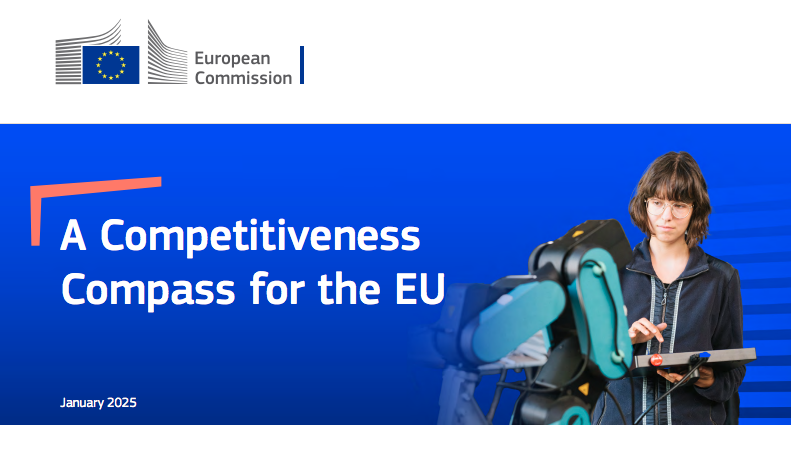
On January 29, 2025, the European Commission presented the EU Compass to reclaim competitiveness and ensure sustainable prosperity as the first major initiative of this mandate.
Following the critical analysis by former Italian Prime Minister Mario Draghi (Draghi Report) on the EU’s position in the global landscape, the need for a structural and systemic shift has become evident, particularly in three key areas: innovation, decarbonization, and security. These areas form the three pillars that will guide the European Union towards economic boost. As President Ursula von der Leyen stated, “the Compass for Competitiveness transforms the excellent recommendations of the Draghi report into a roadmap.”
The three main pillars of this roadmap are complemented by five cross-cutting enablers, including the simplification of administrative procedures, the strengthening of the single market, new financing strategies for competitiveness, skills and quality jobs, and improved coordination between EU and national policies. Below is a summary of the key points:
Closing the innovation gap: While the United States and China are making massive investments in innovation, the EU must speed up to remain competitive in emerging technologies such as Artificial Intelligence and cybersecurity. The Commission will therefore propose the AI Gigafactories initiative and the Apply AI strategy, to develop AI and overcome a major obstacle: the low uptake of AI by businesses. Additional initiatives will be taken to create an environment conducive to the emergence of new start-ups by establishing an efficient venture capital market and strengthening the single market.
Supporting businesses: Excessively burdensome regulations also slow down innovation and undermine competitiveness. With the Simplification Omnibus proposal, the Commission aims to streamline regulations on sustainability, due diligence, and taxonomy. The goal is to reduce administrative burdens by at least 25% for businesses in general and 35% for SMEs.
Decarbonization Action Plan: A dedicated industrial decarbonization initiative will facilitate the transition of affected sectors through administrative simplifications. Additionally, an action plan aimed at reducing energy costs will ensure access to clean energy at affordable prices.
Reducing excessive reliance and strengthening security: The EU must continue to diversify and strengthen its partnerships for sustainable trade and investment to secure access to raw materials, clean energy, sustainable transport fuels, and advanced technologies from around the world. Furthermore, a European preference will be introduced in public procurement for key sectors and critical technologies.
Coordination: Improved policy coordination at both the national and EU levels is essential. In the next Multiannual Financial Framework, a Competitiveness Fund will support the implementation of initiatives under the Competitiveness Coordination Instrument.
The Competitiveness Compass represents an ambitious plan to revitalize the EU economy, making it more innovative, sustainable, and capable of addressing global challenges. The future of Europe will depend on its ability to balance growth, sustainability, efficiency, and strategic security.
Click here for more information and to view the EU Competitiveness Compass factsheet.